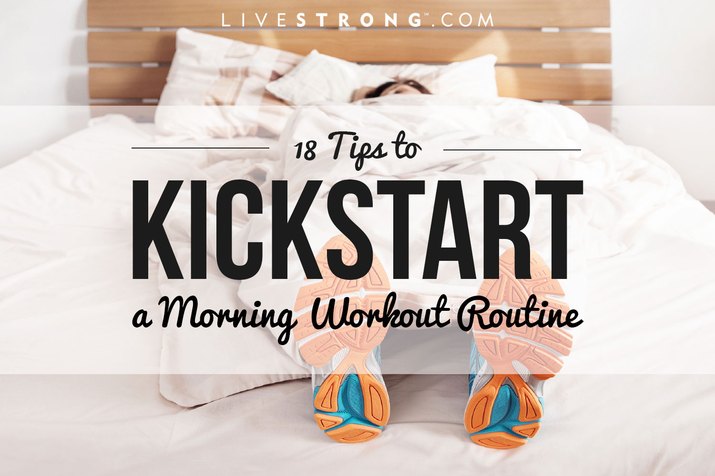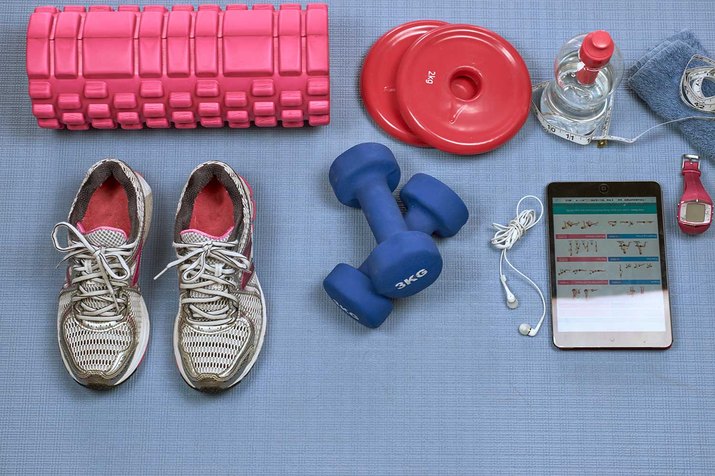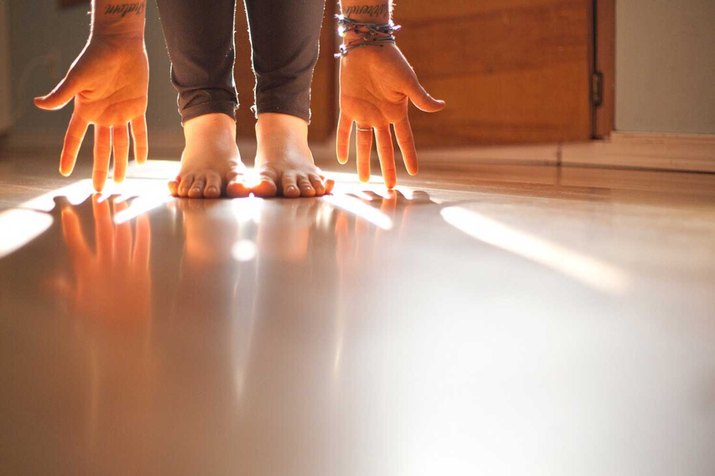
Ready to Kickstart Your Morning?
You can make 1,000 excuses for why you don't want to work out in the morning. Your bed is too comfy. You're too tired from the day before. You only need a few more minutes of sleep. It's too cold outside; the list goes on. Enough! If your goal is truly to become a morning exerciser (or to at least have that option a few days a week), the first step is to stop making excuses.
The next few steps all revolve around making it as easy as possible on your sleepy self to get out of bed and into the gym. To help jump-start your morning exercise routine, here are 18 easy ways to fit in your workout before the rest of your day begins, plus tips from people who know first-hand the benefits of an early sweat session.

Why Exercise in the Morning?
Before you jump right out of bed (or more likely roll), it's important to remind yourself why you're doing this. "Personally, I enjoy going to the gym with less people," says Scott Schreiber, a chiropractor certified in rehabilitation and clinical nutrition. "I have my choice of weight and cardiovascular machines; I never have a wait to use anything in the morning."
Not only is an early gym session less crowded, but according to a March 2017 study published in _Clinical Ob_esity, morning exercise has also been shown to help control appetite, calorie intake and weight loss.
Read more: 17 Reasons to Start Running

1. Slowly Move Up Your Workout Time
If you're usually an evening exerciser, suddenly catapulting your body into the gym at 6 a.m. isn't doing yourself any favors. Instead, try gradually scheduling your workout for earlier and earlier in the day.
"When I get clients to start exercising early, we take small steps and work our way backwards instead of just jumping into 5 a.m. workouts," says Jamie Logie, personal trainer and founder of the Regained Wellness blog and podcast. "Schedules and work are obviously a factor, and if those are in the way, we use a day off or weekend and have them try 11 a.m. workouts, then 10 and so on until we get to, say, 8 a.m., and then stay at that time for a few days before progressing even earlier."
Read more: How to Fit Exercise Into Your Busy Schedule

2. Catch Some Earlier Zzzs
Making sure your morning workout plan becomes reality starts with a good night's sleep and a sane wake-up time. "If a client can go to sleep 45 to 60 minutes earlier at night, not only are they more likely to have a restful sleep, they're also more likely to be more focused and alert during their session," says Darin Hulslander, personal trainer and owner of DNS Fitness and Nutrition.
If you're not the type of person to hop right out of bed, start with smaller increments of 10 to 15 minutes. As your bedtime gets earlier, your workout can start earlier and last longer.
Listen now: How Celebrity Chef Seamus Mullen Saved Himself by Eating Right

3. Be Realistic About Your Schedule
There's no faster way to fail than to set yourself up with unrealistic goals and expectations. Instead, start with short but moderately intense workouts with plenty of warm-up and build from there. "I swear by the 9-Minute Workout," says Annalis Clint, certified personal trainer and author of 20 Pounds/90 Days: Kick Food Cravings, Jump-Start Healthy Habits, and Look Great Naked -- in 4 Weeks.
"I prescribe it to my clients as the 'before breakfast' workout because several studies have shown breaking a sweat before breakfast can boost weight-loss efforts," she says.

4. Have a Contingency Plan
Even the best-laid plans are subject to unforeseen obstacles like inclement weather or even just lack of motivation. "If running on a dark, cold morning will be unappealing, have a backup plan," says Syd Hoffman, health and wellness educator, creator of the All-Day Energy Workout DVD. "Try 30 minutes of dancing (ear buds with great music, ready the night before -- just keep moving)."
Can't face another morning on the elliptical? Find a class that you love, or have plenty of workout DVDs or your favorite YouTube channel on hand for a quick at-home workout. That way, if your first plan falls through, you'll still be able to work out.
Read more: 11 of the Best Video Workouts You Can Do Anywhere

5. Build a Better Workout Playlist
Chances are, you have plenty of anecdotal evidence to support the fact that music helps motivate you for your workout. And science backs you up. A March 2012 British review of studies published in International Review of Sport and Exercise Psychology analyzed how music impacts your workouts, and experts found that pumping up the jams really does help you both before and during your workout — both physically and psychologically. So turn on your favorite Pandora station while you're getting ready and keep the tunes rolling as you head out for a run or off to the gym. Even better, put together your own playlist of songs you know are guaranteed to motivate you.
Read more: Try This Playlist to Pump Up Your Workout

6. Post on Social Media or Use an Accountability App
While you don't have to turn into "that guy" who takes selfies at the gym for Instagram every time you're there, committing to workouts publicly through social platforms like Facebook and Twitter can help keep you accountable. And specialized forums (like the community on LIVESTRONG.com) allow you to digitally connect with people with similar goals. Studies have shown that if you surround yourself with people that are losing weight (even if it's virtually), you're more likely to lose weight yourself.
Read more: Join the Conversation in Livestrong.com's Community Forums

7. Perfect Your Pre- and Post-Workout Prep
"Prepare your gym bag the night before and place your alarm on top of it next to your bed so when you wake up all you have to do is grab and go," says Maurice Buchanan, owner and trainer at UGO1 Fitness in Minnesota. That includes everything you'll need before, during and after your workout.
"And sleep in your workout clothes so you don't have to worry about getting ready in the morning. Most workout clothes are comfortable enough to sleep in," he says. He also recommends fixing a small breakfast for yourself while you're in the kitchen fixing dinner.
Read more: The 30 Best Fitness Accessories and Equipment You Should Have in Your Gym Bag

8. Wake Up and See the Light
Rather than blinding yourself by throwing open your blackout curtains and exposing your eyes to a heavy stream of light first thing after waking up, try leaving your curtains open overnight. The light from outside signals your brain's internal clock (or suprachiasmatic nucleus -- SCN, if you want to get technical) that it's time to transition from sleep to wakefulness.
According to Harvard University's Division of Sleep Medicine, "Light resets the clock to correspond to the day-night cycle. In turn, the clock regulates the timing of dozens of different internal functions, including temperature, hormone release and sleep and wakefulness. The SCN promotes wakefulness by producing a powerful alerting signal that offsets sleep drive." Alternatively, you can try using and a lamp with a dimmer switch that allows you to gradually turn on the light as soon as you wake up.
Read more: 11 Habits That Are Ruining Your Sleep (and How to Fix Them)

9. Find a Workout Buddy and Set a Date
Having a friend or family member on board will make it that much more difficult to skip a workout, knowing that if you don't show, you're letting down a friend. "I recently started working out with a buddy. Knowing there is another human depending on me in the morning really motivates me to get out of bed," says Shane Allen, certified personal trainer and sports nutritionist with Personal Trainer Food. "I can't count how many times I would have hit snooze or reset my alarm for an hour later to not work out. But knowing he'll be disappointed forces me to get up."
Or see if free group workouts (like the November Project) are in your city. Not only will you make new friends, but your new friends will help keep you accountable with their "We Missed You Blog," where members post encouraging messages if you miss a workout you said you'd attend. If you find yourself more motivated by a little friendly competition, download the HEAT running app to race against runners from all over the globe.
Read more: Workouts for Couples

10. Nail the Night Before
Your bedtime routine impacts your workout routine. So don't drink alcohol before bed if you plan on waking up early, and off the TV a few hours before hitting the sack and put your cellphone and laptop away. "At night, when you lay yourself down to sleep, just say no to turning on your electronic device and checking your email," says Robin Palmer, wellness and lifestyle expert and inventor of My Wake UP Call motivational alarm clock messages.
"Instead, infuse these magical moments with inspiration, and envision fulfilling your goals and dreams. If you don't want your subconscious mind to have you tossing and turning all night, steer clear of the negative noise and electronic energy from your electronic devices before bedtime," she says. She also suggests meditating before bed with deep, cleansing breaths and positive mantras as well as avoiding stimulants like caffeine, sugar and nicotine.

11. Force Yourself Out of Bed
If your alarm is right by your bed, you're more likely to reach over and hit snooze repeatedly. "I set my phone's alarm and put it in the bathroom -- not next to my bed," says personal trainer Shane Allen. "This means I physically have to get up, stumble into the bathroom and turn my alarm off. By then, I'm already up. Might as well stay up!"
But don't be too hard on yourself early in the morning. "Try to use an alarm note that is as un-alarming as possible, but will still wake you," says Brandon Mancine, Texas-based NASM-certified personal trainer and Level 2 CrossFit coach "You want your movement to wake you, not a sense of emergency. This will spike your stress response and leave you sluggish the rest of the day." Try an app like Wake Me Up or a device like Philips Wake-Up Light Alarm Clock.
Read more: 10 Proven Tips for a Good Night's Sleep

12. Fuel Your Workout Effectively
While the temptation might be to work out on an empty stomach, especially if you're trying to lose weight or just don't have the appetite right after waking up, you'll want to have something in your stomach to give you energy for your workout. "If you're having breakfast in the morning prior to working out, keep the breakfast simple," says Shaina Simhaee, holistic nutritionist and editor of FastBeets.com. "Prepare overnight oats the night before, have hard-boiled eggs on hand or make your smoothie the night before and keep it in your fridge. Whatever your breakfast of choice is, make sure it's ready to go first thing in the morning. This prevents distractions from getting in the way of you and the gym."
Read more: 14 Protein-Packed Breakfasts to Power You Through the Morning

13. Put Your Money Where Your Mouth Is
Money can be a powerful motivator. So in order to make sure your early-morning workout happens, you may need to put something at stake. "Find an exercise class you love where there's some penalty if you cancel at the last minute," says Jessica Spinner, health coach and former professional ballet dancer. "For example, to get myself to 6 a.m. Pure Barre class, I just remember that they will charge me $15 if I cancel less than 12 hours before class. You better believe I am not interested in losing that money, so I get my bum out of bed."
Read more: The 6 Best Fitness Apps to Get You to Want to Work Out

14. Ease Into Your Morning Workout
Your body has just been at rest for seven to eight hours; don't force it into an intense workout right off the bat. "Don't start with marathon sessions," says personal trainer Brandon Mancine. "If you're strength training, get a few (one to two) major moves in with one to two assistance moves and work your way up. For your cardio, start at about 50 percent. See how you feel the rest of the day. With both, make sure you allot time for warm-up and cooldown."
Or start even simpler from the comfort of your own home. "Start with a 10-minute workout you can do at home before work," says Santa Barbara-based fitness trainer and motivational speaker Jenny Schatzle. "It's proven that even 10 minutes a day changes your brain." Try her 10-minute body-weight workout. Do each move for 45 seconds, write down how many you did, rest for 15 seconds and start the next movement: squats, push-ups, jumping jacks, triceps dips and crunches.
Read more: 10-Minute, Total-Body, No-Equipment Workout

15. Reward Yourself
Working out is hard. So give yourself something to look forward to after all the effort you've put in. "Drop a $5 bill in your jar every time you get up and workout," says health and wellness educator Syd Hoffman. "Place a photo of that special beach in Bora Bora near the container. You will be there -- very soon."
Or treat yourself to some new workout clothes. Chances are you'll feel more confident and more likely to want to go to the gym to show off your new workout wardrobe. And if you're losing weight, it will benefit you psychologically to have better-fitting clothes for your new svelte figure, which will only encourage you to keep going and reach your weight-loss goal.
Read more: Types of Rewards for Losing Weight

16. Record Your Thoughts Afterward
Capture that magical endorphin high post-workout by writing about how great you feel. "I encourage them to try it out for at least one to two sessions and take note of how their day goes," says personal trainer Darin Hulslander. "We often compare notes from their evening sessions as far as their lifts, conditioning, etc., and we can see side by side if their morning workouts are more productive. If they are, that's motivation in itself to continue."
Grab a journal or notepad and record the date and time, what your workout entailed and how you felt immediately afterward. Then leave it by your bed as a reminder on those days when you don't feel like getting out of bed just how rewarding your morning workouts can be.
Read more: 11 Ways to Measure Your Progress on Your Fitness Journey

17. Wake Up to Inspiration
For an immediate jolt of motivation, try hanging an inspiring quote or picture near your bed. Make sure it's one of the first things you'll see in the morning. It could be a visual representation of why you want to work out (to set an example for your family, to reverse the effects an adverse medical condition like diabetes or high blood pressure or to fit into that bikini in time for summer), a reminder of the reward you've set for yourself or one of your favorite motivational quotes. Having that reminder staring you in the face every morning will make it harder to roll over and fall back asleep.
Read more: Motivation: Want It? Earn It.

18. Consistency Is Key
If you want your morning workouts to become a habit, you have to keep working at it. "Based on current research, it takes at least six weeks to establish an exercise habit," says Rachel Straub, certified strength and conditioning specialist and co-author of the book Weight Training Without Injury: Over 350 Step-by-Step Pictures Including What Not to Do. "If you are truly dedicated to becoming a morning exerciser, you must be consistent or you won't be successful." Habits are hard to break and re-form, so don't get discouraged if it's still difficult to get out of bed after a few weeks of trying to get to the gym before work. Just keep at it, and soon enough you'll be working out in the morning without even thinking about it.
Read more: 12 Workout Mistakes That Sabotage Results
Video of the Day
Video of the Day
- Training in the fasted state improves glucose tolerance during fat-rich diet.
- Clinical Obesity: "Comparison between the effect of 6 weeks of morning or evening aerobic exercise on appetite and anthropometric indices: a randomized controlled trial"
- International Review of Sport and Exercise Psychology: "Music in the exercise domain: a review and synthesis (Part I)"
- Harvard University Division of Sleep Medicine: "Healthy Sleep: Under the Brain's Control"